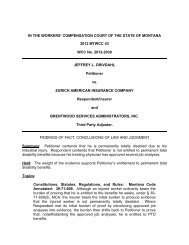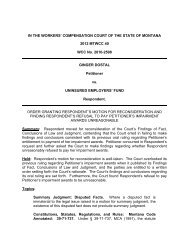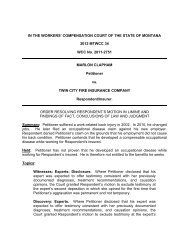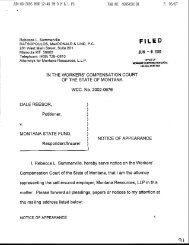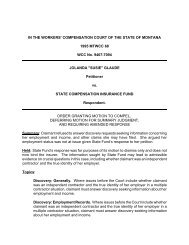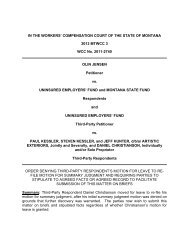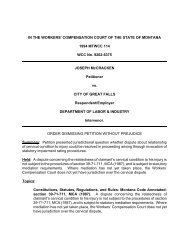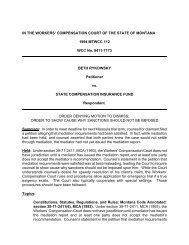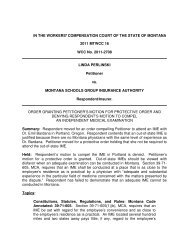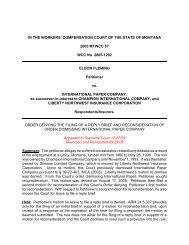2010 MTWCC 16 - Workers' Compensation Court
2010 MTWCC 16 - Workers' Compensation Court
2010 MTWCC 16 - Workers' Compensation Court
Create successful ePaper yourself
Turn your PDF publications into a flip-book with our unique Google optimized e-Paper software.
17 Dawes testified that he was skeptical of the answers the mechanics provided onthe relationship questionnaires because some of their answers were identical.However, he testified that he ultimately did not base his decision on the questionnaires.Rather, Dawes based his decision on his conclusion that none of the mechanics wouldmeet the criteria to receive independent contractor exemption certificates if he appliedfor one. 1718 Dawes explained that the department has the burden of determining that abusiness exists before it issues an independent contractor exemption certificate. Tomake that determination, the department uses a list of “business-like items” withassigned point values. An applicant must score at least 15 points from the department’slist to qualify for an independent contractor exemption certificate. Dawes testified thatalthough he did not score any of the individual mechanics, he concluded that none ofthem would have scored 15 points or more if he had scored the mechanics. 1819 Dawes also found that P & M Transmission furnished hoists, parts washers, andan air compressor for the mechanics’ use. 19 Regarding the method of payment, Dawesfound:The workers were paid for work on their friends[’] cars and [P & MTransmission’s] customer cars, sometimes the customer paid [P & MTransmission], sometimes the mechanic paid, according to thequestionnaire. The workers had to pay a nominal amount to use the shop.No details of the shop lease/rental agreement were found in theindependent contractor agreement or provided by [P & M Transmission.] 20Regarding the right to fire, Dawes found that each mechanic could terminate hisservices at any time without incurring a contractual liability. 2120 Based on his findings relative to these four factors, Dawes concluded that themechanics did not satisfy the control prong of the independent contractor requirement. 22On February 11, 2009, Dawes issued an ICCU decision concerning the employmentstatus of Caldwell, Loomis, Wyatt, Voss, Richter, and Blackwood for the period of17 Trial Test.18 Trial Test.19 Ex. 12 at 6.20 Ex. 12 at 6. Although Dawes reviewed independent contractor agreements in making his determination,the only independent contractor agreements which were entered into evidence were dated January 1, 2008, and thusare not relevant to this <strong>Court</strong>’s findings as they were outside the audit period at issue.21 Ex. 12 at 6.22 Ex. 12 at 7.Findings of Fact, Conclusions of Law and Judgment- 7



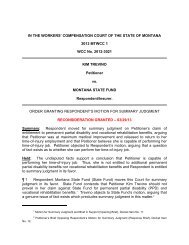
![Bustell v. AIG Claims Service, Inc. [05/03/05] 2005 MTWCC 23](https://img.yumpu.com/49777654/1/190x245/bustell-v-aig-claims-service-inc-05-03-05-2005-mtwcc-23.jpg?quality=85)
![Vallance v. MCCF [07/05/06] 2006 MTWCC 26 - Workers ...](https://img.yumpu.com/48724322/1/190x245/vallance-v-mccf-07-05-06-2006-mtwcc-26-workers-.jpg?quality=85)
